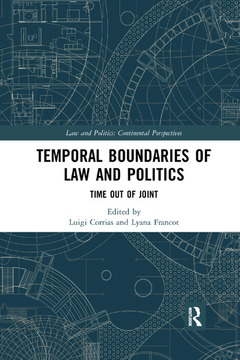Description
Temporal Boundaries of Law and Politics
Time Out of Joint
Law and Politics Series
Coordinators: Corrias Luigi, Francot Lyana
Language: English
Subjects for Temporal Boundaries of Law and Politics:
Keywords
Social Acceleration; social; Suum Cuique Tribuere; acceleration; Core International Crimes; emergency; Emergency Powers; powers; Global Health Security; core; Modern Positive Law; international; Constitutional Polities; crimes; De Baets; time; Legal Time; out; Contemporary Society; joint; Schmitt’s Theory; Lyana Francot; Techno Scientific Progress; Antoine Garapon; Effective Legal Constraints; Bart van Klink; President’s Emergency Powers; Hartmut Rosa; Constitution’s Promulgation; Marc de Wilde; Schmitt’s View; Nomi Claire Lazar; Schmitt’s Claim; Jiří Přib; Executive Emergency Powers; Sven Opitz; Unprecedented Future; Bas Schotel; Constitutional Preambles; Modern Cultural Nationalism; Temporal Categories; Radical Temporality; Future Pandemic; Israeli Supreme Court Ruling
Publication date: 07-2019
· 15.6x23.4 cm · Paperback
Publication date: 03-2018
· 15.6x23.4 cm · Hardback
Description
/li>Contents
/li>Readership
/li>Biography
/li>
In the last decade, the changing role of time in society has once again taken centre stage in the academic debate. A prominent, but surely not the only, aspect of this debate hinges on the so-called acceleration of time and its societal consequences. Despite the fact that time is fundamental to the way in which law and politics function, the influence of the contemporary experience of time on law and politics remains underdeveloped. How, for example, does society?s structural acceleration impact on justice? Does law actually offer stability and predictability in an ever-changing global world? How can legal and political institutions function in the wake of ever-increasing uncertainty? Both law and politics employ time to order society but they are also limited in what can be effectuated by time. It is this very tension between temporal possibilities and limitations that the contributors to this collection ? drawn from different fields of law, as well as from other disciplines ? examine.
Part I: Justice Chapter 1 Judging the Past: Three Ways of Understanding Time Antoine Garapon; Chapter 2 Law at the Right Time: A Plea for Slow Law in Hasty Times Bart van Klink; Chapter 3 Law, Time, and Inhumanity: Reflections on the Impresciptible Luigi Corrias; Part II: Legal CertaintyChapter 4 Airports Built on Shifting Grounds? Social Acceleration and the Temporal Dimension of Law Hartmut Rosa; Chapter 5 Suspended in Gaffa: Legal Slowness in the Acceleration Society Lyana Francot; Chapter 6 Uncertain Futures and the Problem of Constraining Emergency Powers: Temporal Dimensions of Carl Schmitt’s Theory of the State of Exception Marc de Wilde; Chapter 7 Constitutional Preambles and the Uncertain Future Nomi Claire Lazar; Part III: ExpediencyChapter 8 Collective Memory, Constitutional Polity and Functional Differentiation of Modern Society Jiří Přibáň; Chapter 9 Informing Life: Temporal Politics of Information in the Administration of Pandemics Sven Opitz; Chapter 10 Immediacy, Potentia and Constraining Emergency Powers Bas Schotel
Luigi Corrias is Assistant Professor of Legal Philosophy, Vrije Universiteit Amsterdam.
Lyana Francot is Associate Professor of Legal Theory, Vrije Universiteit Amsterdam.
These books may interest you

The Preventive Turn in Criminal Law 116.54 €



